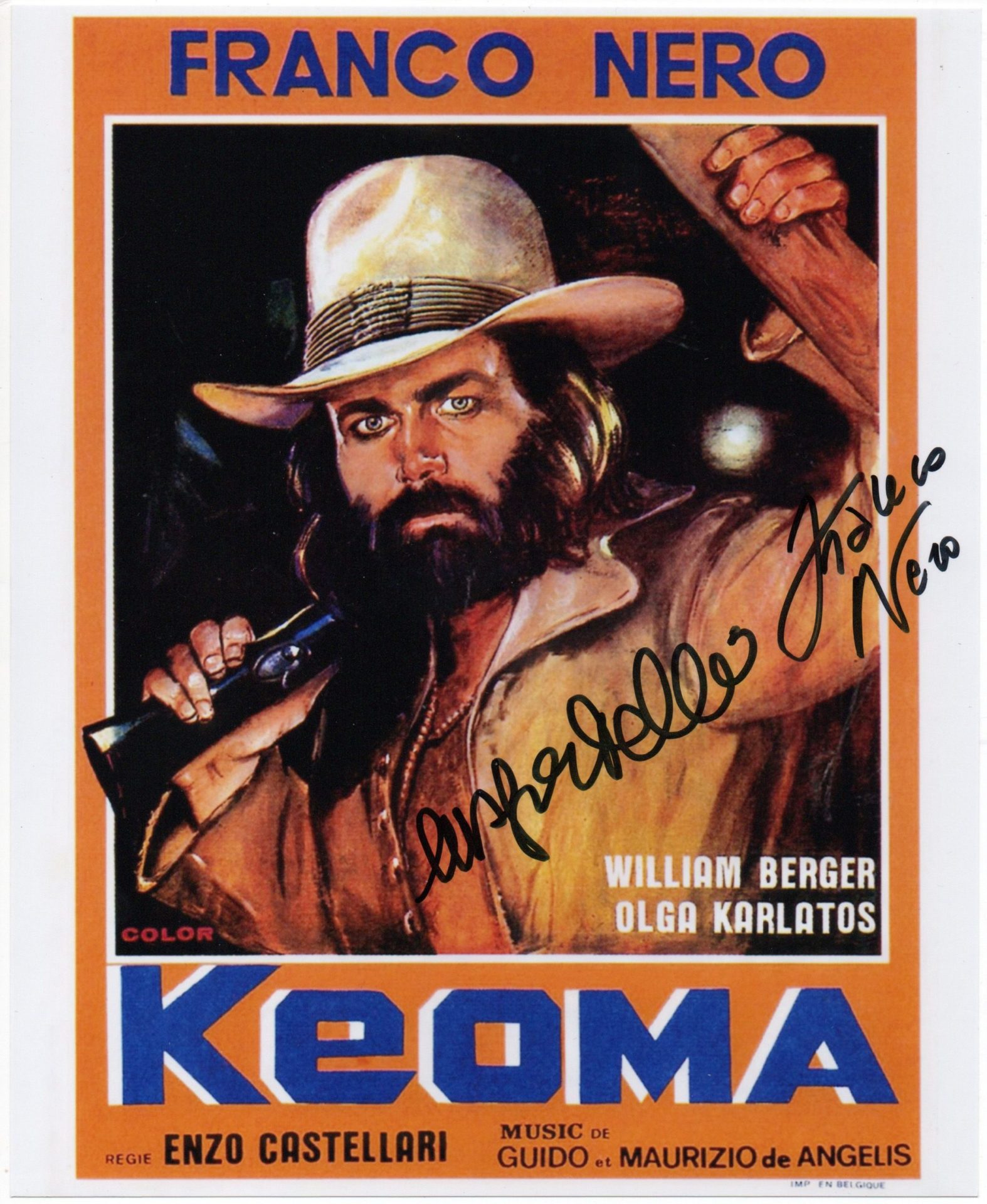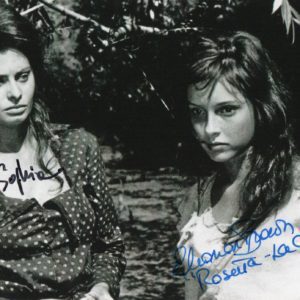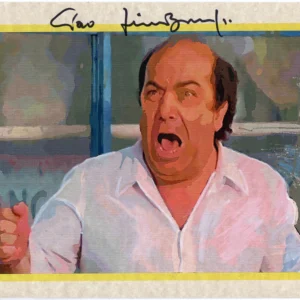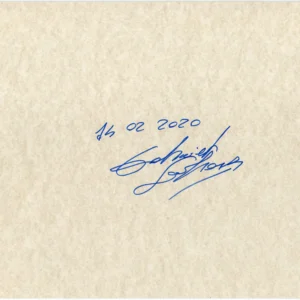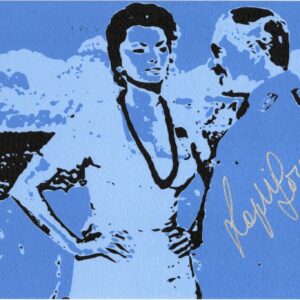Description
Nero’s first film role was a small part in Pelle viva (1962), and he had his first lead role in Sergio Corbucci’s Django (1966) a Spaghetti Western and one of his best-known films. In 1966 from Django he went on to appear in eight more films released that year including Texas, Adios (1966) and Massacre Time. In 1967, he appeared in Camelot as Lancelot, where he met his longtime romantic partner, and later on in life his wife, Vanessa Redgrave. Following this he appeared in the mafia film Il giorno della civetta opposite Claudia Cardinale released in 1968. A lack of proficiency in English tended to limit these roles, although he also appeared in other English-language films including The Virgin and the Gypsy (1970), Force 10 from Navarone (1978), Enter the Ninja (1981) and Die Hard 2 (1990). Although often typecast in films like Los amigos (1973) or Keoma (1976) he has attempted an impressive range of characters, such as Abel in John Huston’s epic The Bible: In The Beginning (1966), the humiliated engineer out for revenge in Street Law, the gay lieutenant in Querelle (1982) and Serbian mediaeval hero in The Falcon (1983). He has appeared in over 150 films, and has written, produced and starred in one: Jonathan degli orsi (1993). More recently, he starred in Hungarian director Koltay Gábor [hu]’s Honfoglalás (Conquest) in 1996, in Li chiamarono… briganti! (1999) by Pasquale Squitieri and subsequently in Koltay’s Sacra Corona (Holy Crown) in 2001. In 2009 he played an eccentric author called “Mario Puzzo” in Mord ist mein Geschäft, Liebling (“Murder is my trade, darling”, Italian title “Tesoro, sono un killer”). German critics found his performance was the best part of the film: “Having Franco Nero playing in this film is really a great joy – it is only regrettable that after his appearances there is still so much film left.” In 2010, Nero appeared in the film Letters to Juliet with Redgrave. In 2011 he appeared as a guest star on the season 13 premiere episode of Law and Order: SVU. His character, although Italian, was based on Dominique Strauss-Kahn. In the same year, he received a star on the Italian Walk of Fame in Toronto, Ontario, Canada. In 2012, Nero made a cameo appearance in the film Django Unchained in one scene alongside Jamie Foxx, who stars as Django Freeman in the film. In the scene Nero plays the original Django, an Italian Mandingo Fighter manager. Nero’s Django then questions Foxx’s Django about how his name is spelled, and asks him to spell it, referencing a scene from Nero’s role as Django in the original Django film. Upon learning that their names are spelled the same way, Nero’s Django says “I know” to Foxx’s Django. In 2016 and 2017 he interpreted Gabriele Tinti’s poetry, giving voice to the masterpieces in the National Roman Museum. Nero is expected to appear in the dark comedy feature film The Immortalist in 2020, along with Sherilyn Fenn, Paul Rodriguez, Aries Spears and Jeff DuJardin, directed by Vlad Kozlov.
Enzo Girolami Castellari (born 29 July 1938) is an Italian director, screenwriter and actor.
Early life
Castellari was born on 29 July 1938 in Rome into a family of filmmakers. His father was a boxer turned film maker Marino Girolami. His uncle is filmmaker Romolo Guerrieri and his brother was actor Ennio Girolami. He initially was a boxer like his father and went to school to get a degree in architecture.
Film career
Castellari began work on film assisting with various jobs on sets of his father’s films. Among his early credits included uncredited roles in directing films such as Few Dollars for Django (1966) and A Ghentar si muore facile (1967). Many of Castellari’s early works are Westerns. He received his official credited directorial debut with Renegade Riders (1967), a film shot in Spain and influenced by Sidney J. Furie’s film The Appaloosa (1966). After releasing the Western Kill Them All and Come Back Alone (1968), Castellari did a war film titled Eagles Over London. By the early 1970s, Castellari began exploring other genres as well such as the thriller Cold Eyes of Fear (1971), the comedy Hector the Mighty (1972), and the comedic swashbuckler The Loves and Times of Scaramouche (1976). He directed his first poliziotteschi film with High Crime starring Franco Nero. Nero and Castellari formed a relationship with the film and work together for seven features. Castellari later noted his work with Nero, stating “I think that to have an actor like Franco Nero is one of the best things that can happen to a director…if it had been possible, I would have made all my films with him” Nero would work with Castellari on the Western Keoma which was only a mild success in Italy on its release, but would later be praised as one of Castellari’s best films. Castellari created further poliziotteschi films in the late 1970s as well as the war film The Inglorious Bastards. Castellari was offered to direct the film Zombi 2, but turned it down as he didn’t feel he would be the right director for a horror film. In the 1980s the popularity of the poliziotteschi faltered and Castellari’s film Day of the Cobra with Franco Nero was not popular in the box office. Castellari followed it up with The Last Shark, a film about a small beach town terrorized by a bloodthirsty great white shark. The film was withdrawn from theaters after Universal Studios sued the production for being too similar to the film Jaws. Castellari next film 1990: The Bronx Warriors was a surprise hit that created a small wave of films from Italy inspired by the John Carpenter film Escape from New York. The mid-to-late 1980s work for Castellari was work made for foreign markets such as Light Blast (1985), Striker and Sinbad of the Seven Seas. In the 1990s, Castellari’s work was mostly dedicated to made-for-television productions. Castellari made a comeback film in 2010 with Caribbean Basterds, a film which received a theatrical release in Italy which was a rarity for locally made genre films at the time. Castellari cameoed as a German mortar squad commander in The Inglorious Bastards, and Quentin Tarantino cast Castellari in the cameo role of a German general in his film Inglourious Basterds (2009), which was inspired by Castellari’s 1978 film. In October 2014 Castellari was awarded at the Almería Western Film Festival.

